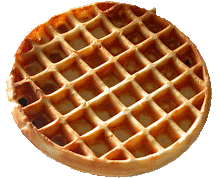
^ Made me laugh, good explanation
In Feed, consumerism and anti-consumerism are big themes. The feed is the ultimate corporate weapon for control. The Feed related companies want you to buy, buy, buy so they can make a gigantic amount of money. Feedlink, OnFeed, and American Feedware are reaping profits from the ignorance of the masses*. Most Americans in this story were raised with the feed and don't know how good life is without it. Sure, the feed has it's perks, but the pop-ups would suck.
Consumerism/anti-consumerism are the most prominent themes in the whole book. Right now, our corporations are creating an army of consumer whores that will buy their junk.
This is where I think Anderson could have gotten his inspiration to write Feed.
Take that Starbucks!
V 
*I hear people saying "It's scary that this could be our future." This isn't our future, this is our present.
